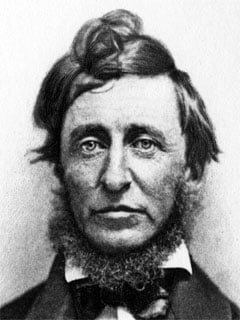Born in 1817, Henry David Thoreau spent most of his life in Concord, Massachusetts. He was sent to Harvard, where he did very well and in 1837, graduated in the top half of his class. Despite his high placement and due to the economic depression, lack of job opportunities, and Thoreau’s disinterest in available careers, he began teaching at the Concord public school. He left after two weeks due to a disagreement over how to discipline students. From there, he started working at his family’s pencil factory. In 1838, Thoreau and his brother John opened and operated a school until it closed in 1841. A second stint in the pencil factory ended when Thoreau was invited to work for and live with his mentor and friend Ralph Waldo Emerson, which led to aspirations of writing.
 Emerson gave permission for Thoreau to use a plot of land he owned at Walden Pond. In the two years Thoreau spent at the pond, he wrote one of his most famous works, Walden, which examines his time spent pursing transcendentalist ideals, and he found inspiration for his essay “Civil Disobedience” when he spent a night in jail.
Emerson gave permission for Thoreau to use a plot of land he owned at Walden Pond. In the two years Thoreau spent at the pond, he wrote one of his most famous works, Walden, which examines his time spent pursing transcendentalist ideals, and he found inspiration for his essay “Civil Disobedience” when he spent a night in jail.
Thoreau spent the rest of his life working in the pencil factory, surveying, lecturing, and publishing essays. He died of tuberculosis in May of 1862, leaving behind many unfinished works and notes that his sister and friends edited to publish posthumously.
To commemorate Thoreau's birthday, we've compiled ten poignant quotes from Walden.
1. “I learned this, at least, by my experiment: that if one advances confidently in the direction of his dreams, and endeavors to live the life which he has imagined, he will meet with a success unexpected in common hours.”
2. “Rather than love, than money, than fame, give me truth.”
3. “The mass of men lead lives of quiet desperation. What is called resignation is confirmed desperation. From the desperate city you go into the desperate country, and have to console yourself with the bravery of minks and muskrats. A stereotyped but unconscious despair is concealed even under what are called the games and amusements of mankind. There is no play in them, for this comes after work. But it is a characteristic of wisdom not to do desperate things.”
4. “Books are the treasured wealth of the world and the fit inheritance of generations and nations.”
5. “We need the tonic of wildness...At the same time that we are earnest to explore and learn all things, we require that all things be mysterious and unexplorable, that land and sea be indefinitely wild, unsurveyed and unfathomed by us because unfathomable. We can never have enough of nature.”
6. “As if you could kill time without injuring eternity.”
7. “If you have built castles in the air, your work need not be lost; that is where they should be. Now put the foundations under them.”
8. “I find it wholesome to be alone the greater part of the time. To be in company, even with the best, is soon wearisome and dissipating. I love to be alone. I never found the companion that was so companionable as solitude.”
9. “We must learn to reawaken and keep ourselves awake, not by mechanical aids, but by an infinite expectation of the dawn, which does not forsake us even in our soundest sleep. I know of no more encouraging fact than the unquestionable ability of man to elevate his life by a conscious endeavour. It is something to be able to paint a particular picture, or to carve a statue, and so to make a few objects beautiful; but it is far more glorious to carve and paint the very atmosphere and medium through which we look, which morally we can do. To affect the quality of the day, that is the highest of arts.”
10. “All men want, not something to do with, but something to do, or rather something to be.”
Sources:
Schneider, Richard J. (2015). Life and Legacy: Thoreau’s Life. Retrieved May 25, 2019, here.
Witherell, Elizabeth, and Elizabeth Dubrulle. (1995). Reflections on Walden. Retrieved May 25, 2019, here.








